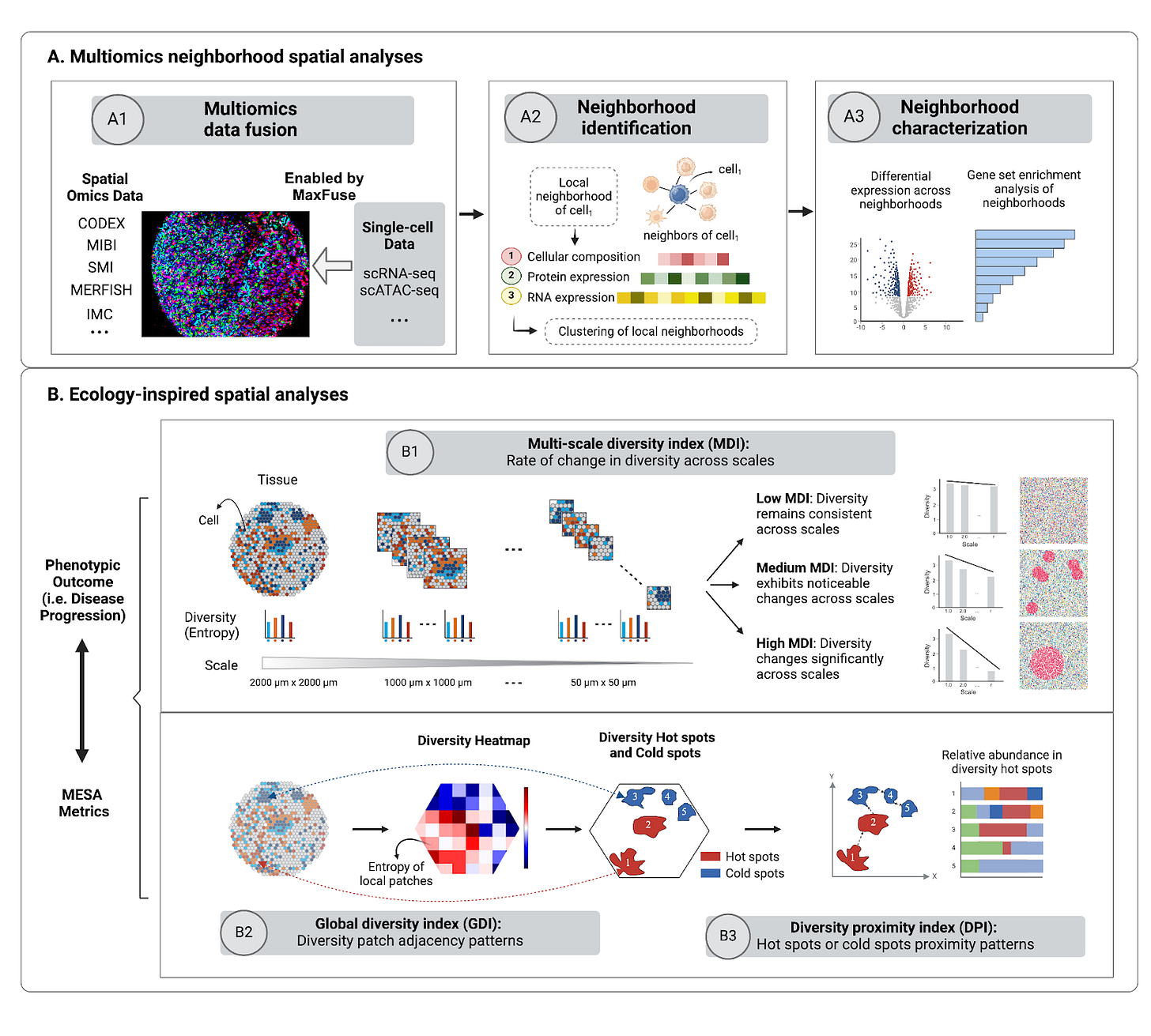📢 Highlights
34M PubMed Abstracts and 40 Databases Yields iKraph The Largest Biomedical Knowledge Graph Yet
Siemens Bets $5.1B That Scientific Software Enhanced Manufacturing, Aquiring Dotmatics
U of Michigan Achieve 75% Power Reduction for Robotics Control Systems with Biomimetic Computing Architecture
Not yet a member of our super awesome slack community of >9000? Join HERE 🤗
👀 In Case You Missed it …
AI Crawled 34 Million PubMed to Build The Biggest Biomedical Knowledge Graph Yet
In a new Nature Machine Intelligence paper (also here) researchers from Florida State University and AI company Insilicom have unveiled iKraph, a massive biomedical knowledge graph built by processing over 34 million PubMed abstracts with their award-winning natural language processing pipeline. The system extracts nearly 31 million unique relations between 10.7 million biological entities, far exceeding the content in manually curated databases. The team developed a probabilistic semantic reasoning algorithm that enables causal inference between indirectly connected entities, demonstrating its effectiveness in drug repurposing for COVID-19 where one-third of their predicted candidates from early 2020 were later validated by clinical trials or research publications. This potent resource additionally integrates relations from 40 public databases and high-throughput genomics data. What is impressive is that it was trained on only abstracts, and not the body of the articles itself. Its code is available on Github.
Behind the Deal: Siemens Takes a Big Step with Dotmatics
German industrial conglomerate Siemens’ decision to acquire Dotmatics for $5.1 billion is a bold move into the life sciences software arena. The sales process has been public for some time, but the final deal details show positive trends for the life sciences industry. This acquisition isn't just about numbers; it reflects a deeper transformation. Dotmatics started in 2005 as a spin-off from MSK, initially serving as a specialized data platform for researchers. Over the years, it has rapidly expanded through strategic acquisitions, including BioBright in 2020, which focused on lab automation, and merging with Insightful Science in 2021, known for popular tools like GraphPad Prism and SnapGene.By 2022, Dotmatics combined its various offerings under a single brand, catering to over 10,000 clients and two million scientists globally. Its latest product, Luma, a low-code platform that integrates complex scientific data, further positions it in the realm of AI-driven research and development—a space Siemens is eager to dominate.
Siemens’ strategy is straightforward: they aim to integrate Dotmatics into their Xcelerator platform, creating a seamless digital journey from discovery to manufacturing in life sciences. The potential market is significant—an estimated $11 billion—but the acquisition cost is also steep. The 17x forward revenue / 39x EBITDA multiple has raised eyebrows, especially when considering strong competitors like Dassault Systèmes and Thermo Fisher.This move is far from a standard software acquisition. It represents a calculated risk to spearhead the digital evolution of R&D. Siemens stands to gain a comprehensive platform and a robust scientific user community. However, making this integration work and meeting high synergy expectations will be the true challenge.
Neuromorphic Computing Dramatically Cuts Energy Needs for Robotics
University of Michigan researchers have developed a brain-inspired computer that can control a rolling robot while using just 25% of the power required by conventional controllers. The system combines a neuromorphic processor with a novel algorithm that mimics how neurons process information—using sparse, event-driven computations rather than continuous sensing. The approach allows the robot to navigate obstacles while consuming a mere 200 milliwatts of power, comparable to a single LED bulb. As robotics applications expand in healthcare and biotechnology, this energy efficiency breakthrough could enable longer-running autonomous systems for everything from laboratory automation to therapeutic delivery.
UniteLabs Secures €2.77M to Create the Operating System for Lab Automation
Munich-Based UniteLabs has raised €2.77 million in pre-seed funding to develop what they're describing as "the operating system for AI-driven biotech research." The Munich-based startup, founded by Robert Zechlin, Lukas Bromig, and Julian Willand, is tackling a fundamental challenge in laboratory automation: the lack of standardized connectivity between different instruments. Their platform creates bidirectional connectors that allow diverse lab equipment to communicate seamlessly, breaking down data silos that have historically limited automation potential. The round was led by NAP (formerly Cavalry Ventures) with participation from PUSH, Acurio Ventures, OMA Business Angels, and LANA Ventures. UniteLabs has already built 40 connectors for various lab devices and is initially focusing on liquid handlers—critical automation tools used in experiments ranging from COVID-19 testing to DNA sequencing. Their longer-term vision involves expanding to other instruments including chromatography systems, plate readers, robotic arms, and bioreactors, ultimately creating the technological foundation for AI integration into laboratory processes.
Mapping tissues like ecosystems
Researchers from Stanford, MIT, and Weill Cornell have unveiled MESA (Multiomics and Ecological Spatial Analysis), a framework that blends spatial omics, single-cell data integration, and concepts from biodiversity to decode tissue architecture quantitatively. Instead of relying on predefined cell types, MESA defines cellular neighborhoods using protein and mRNA expression, then quantifies spatial heterogeneity using diversity indices inspired by ecology. Applied to human tonsil, mouse spleen, and liver cancer datasets, MESA reveals conserved and functionally distinct microenvironments and outperforms existing methods in linking tissue structure to disease progression. The tool is open-source and available as a Python package on GitHub.
Neuromorphic Computing Dramatically Cuts Energy Needs for Robotics
University of Michigan researchers have developed a brain-inspired computer that can control a rolling robot while using just 25% of the power required by conventional controllers. The system combines a neuromorphic processor with a novel algorithm that mimics how neurons process information—using sparse, event-driven computations rather than continuous sensing. The approach allows the robot to navigate obstacles while consuming a mere 200 milliwatts of power, comparable to a single LED bulb. As robotics applications expand in healthcare and biotechnology, this energy efficiency breakthrough could enable longer-running autonomous systems for everything from laboratory automation to therapeutic delivery.
Ginkgo Join Forces with Plex Research for AI-Powered Drug Discovery
Plex Research, an AI-driven drug discovery startup, is teaming up with Ginkgo Bioworks’ data arm to probe their gene expression dataset. Calle GDPx2, the dataset is a large-scale transcriptomics survey that measures compound-induced gene expression across diverse human cells. At close to 4 terabytes (TB) in size, it consists of data generated from 4 human primary cell types, 85 compound treatments, 6 doses and 4 replicates.Their AI platform will hunt for hidden links between drugs and diseases – think drug repurposing leads or previously unknown mechanisms of action – by analyzing how diverse compounds perturb various human cell types. It’s an example of how combining high-throughput perturbation profiling data with novel AI methods can illuminate new biology from old experiments, potentially accelerating drug discovery in a data-driven way.
AI Capital's Mega-Fundraise Positions It for Biotech's Computational Future
In true AI fashion the curiously titled VC firm “AI Capital” has secured an eye-popping $2 billion for its second fund focused on computational biology and AI-driven healthcare companies. The raise, one of the largest ever for a biotech-focused fund, comes as AI-native drug discovery companies like Isomorphic Labs and Insilico Medicine demonstrate increasing clinical validation. Beyond just backing startups, AI Capital plans to launch its own ventures and provide computational infrastructure for portfolio companies—potentially addressing the capital-intensive nature of biotech R&D. With big pharma increasingly embracing AI for drug discovery, the timing suggests we're reaching an inflection point where computational approaches are becoming central, not peripheral, to therapeutic development.
Paige’s pan-cancer AI pathology tool earns FDA “Breakthrough” Designation
Pathology AI pioneer Paige has been awarded an FDA Breakthrough Device designation for its new PanCancer Detect system. The tool uses machine learning to flag suspicious cancer foci across a wide range of tissue types (not just one organ) – reportedly the first AI in pathology to earn a multi-tissue designation. Trained on over 5 million pathology images, PanCancer Detect is part of Paige’s “Alba” platform and currently for research use only, but the Breakthrough status should fast-track its journey to the clinic. Paige also holds FDA clearances on single-tissue digital pathology tools for clinical tools such as Paige Prostate Detect and Paige FullFocus. It’s another signal that regulators are embracing AI diagnostics to help overworked pathologists catch more cancers, faster.
Science Exchange Expands Lab Management Offerings with HappiLabs Acquisition
Scientific outsourcing website Science Exchange has acquired virtual lab management company HappiLabs in a move to streamline R&D operations for biotech companies. The acquisition adds HappiLabs' procurement and vendor management capabilities to Science Exchange's existing marketplace of over 3,500 CROs and service providers. Together, they'll offer an integrated solution for outsourced research, lab supplies procurement, and vendor management—all aimed at helping biotechs maximize their runway in today's challenging funding environment.
Inverting prediction for general binder design
Born from a collaboration between Swiss and MIT researchers, the new protein AI tool BoltzDesign1 introduces a structure-based protein design framework that inverts the Boltz-1 all-atom structure prediction model to generate protein binders across various targets, including small molecules, nucleic acids, and metals.. Developed by researchers at MIT and EPFL, the method avoids the computational cost of backpropagation through diffusion steps by optimizing directly on the predicted distogram. This enables flexible ligand modeling and generalizable binder design without fine-tuning. Compared to RfDiffusionAA, BoltzDesign1 produces more diverse structures and achieves higher in silico success rates across multiple metrics. The code and data are available on GitHub.
Differential Bio Exits Stealth Mode with Bold Biomanufacturing Vision and $2M
A new AI-powered biomanufacturing startup, Differential Bio, has emerged from stealth with $2M in seed funding to transform how we produce biologics. Differential Bio, founded by former NASA scientists, combines AI optimization with automated robotic systems to create what they're calling "self-driving bioreactors." Their platform aims to slash development timelines from years to months while reducing production costs by up to 90%. Rather than focusing solely on R&D, the company is tackling the entire biomanufacturing workflow—from cell line development through scale-up. With pharmaceutical manufacturing costs skyrocketing, their timing couldn't be better.
🗓️ Upcoming BiB Events
See our handy dandy Lu.ma event calendar HERE, please RSVP so folks can plan accordingly!
.Vancouver Bits in Bio Meetup, Tuesday, April 8 at 5:30 PM, at Flamingo Cafe&Bar
First event in Vancouver!
Thank you to Soniya Jagyasi for organizing
Bits in Bio Global Learning Mixer – Thursday, April 10 at 10:00 AM PT
Thanks to Sahil Patel for organizing!
Bits in Bio in CO – inaugural meetup/mixer, Thursday, April 10 at 4:30 PM, at 1150 Pine St
First meetup in Colorado!
Thank you to Joost and Kathryn for organizing
Bits in Bio Dubai Virtual Meetup, Thursday, April 10 at 7:00 PM
First event in Dubai!
Thank you to Roman Novikov for organizing
Atlanta Bits in Bio Happy Hour, Tuesday, April 15 at 5:30 PM
First meetup in Atlanta!
Thank you to organizers Nicholas Justice, Eli Fine, and Eddie Lai
📰 Top Community Conversations
@Shaq observed several of the folks involved with the Dotmatics M&A are our very own!
Check out the conversation here!
🏢 New Job Openings
Notable postings below - over 100 more on our community job board!
Engineer (Multiple Roles) at Isomorphic Labs
Part-Time Entrepreneur in Residence at ValleyDAO
🙋 🙏 Community Asks
Feedback: How is the Newsletter doing? We’re trying different formats/content. In case the hyperlink above didn’t get your attention, maybe a bright orange button will!
Volunteer: Want to get involved with Bits in Bio, meet new members across the community, and learn about the ecosystem? We are looking for volunteers to help us create great content and manage the community.
🙏 Thank you for being a BiB Weekly reader!
We want to deliver what matters most in Bio AI and would love your feedback on how we can do better. Please weigh in as anon here or DM me directly!









